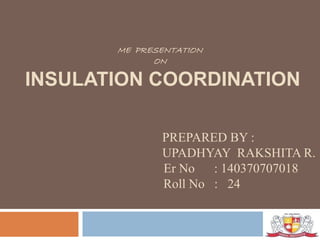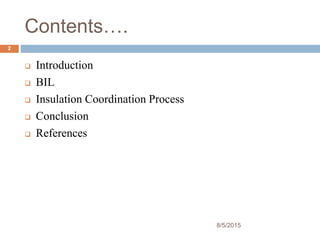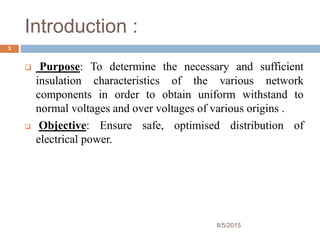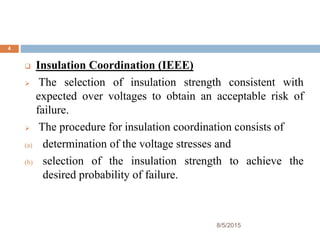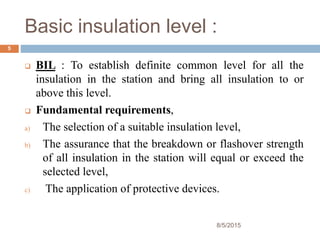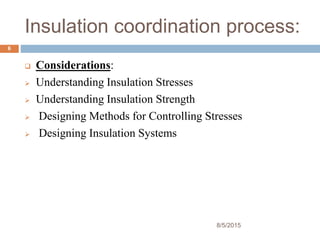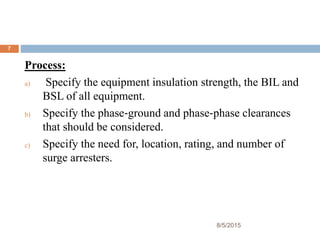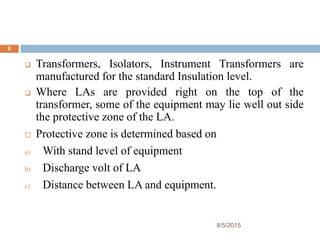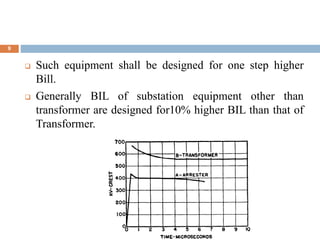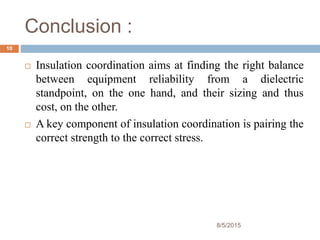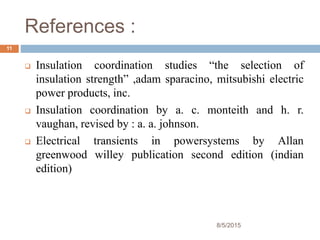Insulation coordination
- 1. ME PRESENTATION ON INSULATION COORDINATION PREPARED BY : UPADHYAY RAKSHITA R. Er No : 140370707018 Roll No : 24
- 2. Contents….  Introduction  BIL  Insulation Coordination Process  Conclusion  References 8/5/2015 2
- 3. Introduction :  Purpose: To determine the necessary and sufficient insulation characteristics of the various network components in order to obtain uniform withstand to normal voltages and over voltages of various origins .  Objective: Ensure safe, optimised distribution of electrical power. 8/5/2015 3
- 4.  Insulation Coordination (IEEE)  The selection of insulation strength consistent with expected over voltages to obtain an acceptable risk of failure.  The procedure for insulation coordination consists of (a) determination of the voltage stresses and (b) selection of the insulation strength to achieve the desired probability of failure. 8/5/2015 4
- 5. Basic insulation level :  BIL : To establish definite common level for all the insulation in the station and bring all insulation to or above this level.  Fundamental requirements, a) The selection of a suitable insulation level, b) The assurance that the breakdown or flashover strength of all insulation in the station will equal or exceed the selected level, c) The application of protective devices. 8/5/2015 5
- 6. Insulation coordination process:  Considerations:  Understanding Insulation Stresses  Understanding Insulation Strength  Designing Methods for Controlling Stresses  Designing Insulation Systems 8/5/2015 6
- 7. Process: a) Specify the equipment insulation strength, the BIL and BSL of all equipment. b) Specify the phase‚Äêground and phase‚Äêphase clearances that should be considered. c) Specify the need for, location, rating, and number of surge arresters. 8/5/2015 7
- 8.  Transformers, Isolators, Instrument Transformers are manufactured for the standard Insulation level.  Where LAs are provided right on the top of the transformer, some of the equipment may lie well out side the protective zone of the LA.  Protective zone is determined based on a) With stand level of equipment b) Discharge volt of LA c) Distance between LA and equipment. 8/5/2015 8
- 9.  Such equipment shall be designed for one step higher Bill.  Generally BIL of substation equipment other than transformer are designed for10% higher BIL than that of Transformer. 8/5/2015 9
- 10. Conclusion : ÔÇ® Insulation coordination aims at finding the right balance between equipment reliability from a dielectric standpoint, on the one hand, and their sizing and thus cost, on the other. ÔÇ® A key component of insulation coordination is pairing the correct strength to the correct stress. 8/5/2015 10
- 11. References :  Insulation coordination studies “the selection of insulation strength” ,adam sparacino, mitsubishi electric power products, inc.  Insulation coordination by a. c. monteith and h. r. vaughan, revised by : a. a. johnson.  Electrical transients in powersystems by Allan greenwood willey publication second edition (indian edition) 8/5/2015 11
